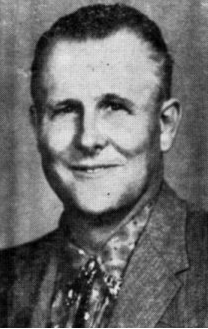Lydick is called "Watson" here. Not a good omen
Howard Leroy Lydick, September 2, 1929 (Anthony, Kan.) - August 5, 2008 (Richardson, Tex.)
VP candidate for Prohibition Party (2004)
VP candidate for Prohibition Party (aka National Prohibition Party) (2008)
Running mate with nominee (2004, 2008): Earl F. Dodge (1932-2007)
Running mate with nominee (2008): Gene C. Amondson (1943-2009)
Popular vote (2004): 140 (0.00%)
Popular vote (2008): 0 (0.00%)
Electoral vote (2004, 2008): 0/538
The campaign (2004):
2004 was one of the more interesting election years for the Prohibition Party. It all came down to personality as the Party experienced a serious public schism that was a long time coming. Some of the details and exact sequence of events have differing and conflicting accounts, so I will tread carefully here.
The figure at the center of the controversy was Earl Dodge. He had been the Party's VP nominee in 1976 and 1980, and the Presidential nominee since 1984. Whether Dodge had kept the flame barely alive when it otherwise would have been extinguished, or ran the Party into the ground with the worst showing in their entire history in 2000 through self-serving behavior will forever be a topic of debate. In that year he barely overcame a challenge for the nomination.
In addition to being a lackluster vote-getter, Dodge was accused of running a nontransparent, secret personality-driven operation and, according to one news report of "inadequate accounting and even thievery."
In the summer of 2003, the timing being the traditional quadrennial time the Prohibition Party meets to nominate their national candidates, Dodge held what today's official Party webpage calls "A private, invitational conference of (some) Prohibition National Committeemen" held in Dodge's living room in Denver. Media reports said only 8 or 9 people were present, including Dodge and two of his daughters.
The running-mate selected was Texas attorney Howard Lydick, a 73-year old heart transplant recipient and lifelong Republican until he joined the Prohibition Party in 1995.
The reformers in the Party rejected the Dodge nomination and when they subsequently met in Fairfield Glade, Tenn. they considered themselves the true and official deal and the Dodge faction to be invalid. They nominated Gene C. Amondson for President with Leroy John Pletten of Michigan as the VP. Some accounts say they attempted to pacify Dodge by awarding him with a "chairman emeritus" title and offering to make Lydick the official running-mate. But it didn't take. Lydick proved himself to be solidly in the Loyalist faction when he said he would not run with anyone but Dodge.
Dodge himself dismissed the Reformer faction, "It's not a split from our party. It's just a couple of people. Sort of like a flea on an elephant that's trying to use our name to get some attention." He also said the publicity garnered by the internal conflict generated more attention than usual for the Party and he deemed that a positive thing.
Of the 16 national tickets that had ballot access in 2004, the Dodge/Lydick duo placed 16th. They also finished last in the only state where they appeared as an option, in Dodge's Colorado with 0.01% of the popular vote. The Amondson/Pletten ticket, under the Concerns of People banner, were also on the Colorado ballot, where they finished with more than twice the popular vote than Dodge/Lydick. From the Reformer faction point of view, the Colorado results vindicated their effort and they felt the issue of who comprised the real Prohibition Party was settled.
If the Dodge/Lydick ticket had emerged victorious in 2004, Lydick would have elevated to the Presidency upon the death of Dodge Nov. 7, 2007. And Lydick himself died Aug. 5, 2008, meaning the USA would have had an unelected President for the remainder of the term, like it did with President Ford 1973-1977.
The campaign (2008):
The Dodge/(and now bearded) Lydick team were gearing up for the 2008 election, having formed their ticket in June, 2007. The Amondson/Pletten campaign solidified shortly after, and the stage was set for another Loyalist faction vs. Reformer faction election battle with the same personalities.
On the morning of Nov. 7, 2007 Dodge suddenly dropped dead at the age of 74 in the airport in Denver while waiting to board a flight to Pennsylvania in order to attend a button show.
Rather than fill the void left by Dodge and assume the Presidential nomination, the 77-year old Lydick made an effort for reconciliation. "We want to heal the division," he said, "Amondson is acceptable to me, and he has a long history in the temperance movement." Even though Pletten had already been tagged as Amondson's 2008 running-mate, Lydick apparently offered to take his place.
Some in the Party were wary. According to a Mar. 2008 news piece by Raphael Ahren:
But the reconciliation may not happen if Lydick insists on running. Before Dodge’s death, Amondson’s 2004 running mate, Leroy Pletten, had been nominated to run with him once more in 2008. And he still intends to do so. Pletten strongly opposes Lydick and the Dodge faction, calling them “crooks and liars” and speaking bluntly about the prospects of reconciliation: “That’s what Hitler always said, that he wants peace.”
According to one secondary source (thegreenpapers.com) Lydick was named as Amondson's running-mate for a ballot access attempt in Nevada. It is possible this effort was spearheaded by what remained of the Dodge faction. An Amondson/Lydick button was even produced.
Mr. Lydick died on Aug. 5, 2008, marking one of the few times in US history where both Presidential and VP nominees of the same ticket did not survive between the nomination and Election Day.
Election history: none
Other occupations: US Army (Occupied Germany), insurance adjuster, attorney, President of the National Temperance and Prohibition Council, Chairman of the Independent Committee on Alcohol and Drugs for the United Methodist Church
Buried: Restland Memorial Park (Dallas, Tex.)
Notes:
Buried in the same cemetery as Tom C. Clark, Patrick Cranshaw, and Ray Price.

































